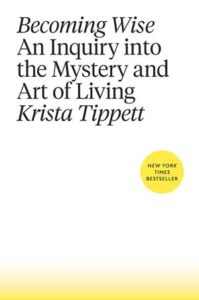Becoming Wise: An Inquiry into the Mystery and Art of Living
Reviewed by William Shetter
November 1, 2017
 By Krista Tippett. Penguin Press, 2016. 288 pages. $28/hardcover; $17/paperback; $12.99/eBook.
By Krista Tippett. Penguin Press, 2016. 288 pages. $28/hardcover; $17/paperback; $12.99/eBook.
Buy from QuakerBooks
“I’m a person who listens for a living. . . . This book chronicles some of what I’ve learned.” These are a few of the introductory words written by someone who to many Friends may not need introduction. The voices she listens to are her conversation companions in her popular and award-winning radio program On Being. She is the author of the best-selling Speaking of Faith and Einstein’s God.
The narrative of this book knits together excerpts from conversations she has had with a broad variety of partners—in an appendix she lists more than 200. From Tippett’s many conversations she has selected just five “breeding grounds for wisdom” around which she structures her often personal narrative.
Words. Naming things and concepts brings their essence into being, and we are ready for fresh language to approach each other. The word “tolerance,” for instance, no longer reaches far enough; it is too small an idea for our present time. “The point of learning to speak together differently,” she says, “is learning to live together differently,” not merely tolerating. This chapter explores a variety of aspects of the art and skill of truly listening conversations, and Tippett provides excellent examples of how asking incisive and animating questions is a particularly powerful use of words. In these and five more excerpted conversations that appear in the chapter’s endnotes, she lucidly pieces together an astonishing variety of insights.
The body. Mind and spirit join physicality into one inseparable whole. One of the conversations shines an illuminating light on the Jewish concept of the soul as not preexistent but emergent, formed only through physicality and relational experience: “We need our bodies to claim our souls,” she says. Another of the conversational excerpts is an exploration of the worldwide L’Arche communities, illuminating the ways in which the creation of support networks for those with mental disabilities illustrates this spirit–body wholeness, able-bodied and handicapped striving to share each other’s lives. Still another pointed out that Descartes’s “I think, therefore I am” is too cerebral, and should be “I feel, therefore I am”—we must not just think our existence but feel it.
Love. The conversations excerpted here are searches for the strength and resilience behind a word that for Tippett is the most watered-down in the language. It’s not just a feeling but a way of being—searching in “the quiet spaces of the everyday in which we live and move and have our being.” It also involves accepting the difficult task of appealing to the goodness in every human being and never giving up. The reality of this idea has been nowhere more forcefully and personally experienced than by the former civil rights activist Rep. John Lewis of Alabama. Another person interviewed claims that love is “like dark matter, this force that permeates everything.”
Faith. The subtitle of this chapter is “The Evolution.” Truly living faith evolves from a childhood fear of not measuring up, through successive stages toward a mature faith: learning to reckon with the mysteries that make life life. The origins of a deeper and sturdier mature faith are to be found in wondering, and this more or less sums up the diverse ways interviewees saw their evolving faith. Tippett sees a remarkable growth of mature faith: centering prayer, spiritual direction, retreats, and meditation are becoming mainstream as never before. There is frequent exploration—nimbly sidestepping clichés—of the ways in which the mystic and the scientist are converging in their sense of wonder and never-ending discovery.
Hope. It is not wish-based optimism, not an emotion, but a firmly reality-based process. “It is a privilege,” she says, “to hold something robust and resilient called hope.” The L’Arche movement is invoked once again as a prominent example of this deeply rooted confidence in goodness. This final chapter is in many ways the most intense and personal of the book. Tippett never limits herself to simply quoting others, but in personal reflections reminds us of all that these conversations have stirred up in her. She reflects, “I am dazzled by the great good I can discern everywhere out there. I’ve shared a sliver in these pages, just a sliver.”
Has this book shown us routes to “becoming wise”? The two words of the title neatly wrap up the book’s message: becoming—the path always rich with possibility—is wisdom, and the source of wisdom is this becoming. After journeying through all these wide-ranging conversations that she so skillfully knits together, we see that the answer has been at our fingertips all along: “We have it in us to become wise.” All of us do, and it is in opening new conversational spaces that we unlock the wisdom in each other.



Comments on Friendsjournal.org may be used in the Forum of the print magazine and may be edited for length and clarity.